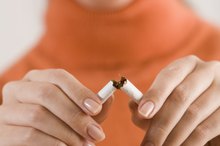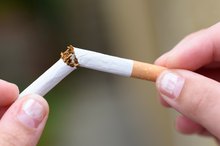Why Am I Exhausted Since I Quit Smoking?
The cigarette is an effective and amazingly efficient method of delivering nicotine to the brain. According to The National Institute on Drug Abuse, a smoker receives 1 to 2 mg. of nicotine for every cigarette smoked. The fast delivery to the brain makes nicotine a very addictive substance. Withdrawal symptoms include difficulty sleeping and tiredness. Feeling exhausted is a normal, transient symptom when you quit smoking.
How Does Nicotine Work?
Addiction happens in the brain, and nicotine effectively alters the pleasure circuitry in your brain. Like other addictive substances, nicotine increases the neurotransmitter dopamine. Dopamine is believed to cause pleasurable feelings. Nicotine levels in the brain peak only 10 seconds after inhalation, according to the National Institute on Drug Abuse. This fast activation of pleasure in the brain cements the association of smoking and feeling good. Nicotine effects wear off as fast as it acts, leaving the smoker wanting more.
- Addiction happens in the brain, and nicotine effectively alters the pleasure circuitry in your brain.
Symptoms of Nicotine Use
How do I Stop Smoking Cigars?
Learn More
In addition to boosting mood, nicotine has a number of other effects. It is an appetite suppressant and elevates blood sugar. Your heart rate will increase by 10 to 20 beats per minute and blood pressure will increase by 5 to 10 mmHg. Nicotine increases alertness and memory, making tasks that depend on these traits easier for the smoker.
- In addition to boosting mood, nicotine has a number of other effects.
- Nicotine increases alertness and memory, making tasks that depend on these traits easier for the smoker.
Withdrawal Symptoms
Nicotine withdrawal symptoms can be severe, however, most symptoms peak in two to three days. Trouble sleeping and bad dreams are withdrawal symptoms that increase daytime tiredness. Along with cravings, you may feel irritable, anxious, impatient and depressed. Some people also get headaches from withdrawal.
- Nicotine withdrawal symptoms can be severe, however, most symptoms peak in two to three days.
Don't Give Up
Symptoms After You Quit Smoking
Learn More
Ways to relieve symptoms of nicotine withdrawal such as exhaustion are available. Nicotine replacement comes in the form of gum, inhalers, nasal spray or skin patches. These methods can help with initial symptoms and cravings; once you feel relief, you can gradually decrease the dose. Prescription medications also may make quitting easier. Ask your doctor about bupropion or varenicline. Keep in mind that the tiredness from quitting smoking is temporary and that around 38 million people have beat nicotine addiction, according to MedlinePlus, an online resource of the National Institutes of Health.
- Ways to relieve symptoms of nicotine withdrawal such as exhaustion are available.
- Keep in mind that the tiredness from quitting smoking is temporary and that around 38 million people have beat nicotine addiction, according to MedlinePlus, an online resource of the National Institutes of Health.
Related Articles
References
- MedlinePlus: Nicotine Addiction and Withdrawal
- Managing withdrawal. U.S. Department of Health and Human Services.
- Cosci F, Pistelli F, Lazzarini N, Carrozzi L. Nicotine dependence and psychological distress: outcomes and clinical implications in smoking cessation. Psychol Res Behav Manag. 2011;4:119-28. doi:10.2147/PRBM.S14243
- Bruijnzeel AW. Tobacco addiction and the dysregulation of brain stress systems. Neurosci Biobehav Rev. 2012;36(5):1418-41. doi:10.1016/j.neubiorev.2012.02.015
- Nicotine replacement therapy. U.S. National Library of Medicine. U.S. Department of Health and Human Services.
- Biology of addiction. National Institutes of Health. U.S. Department of Health and Human Services. 2015.
- Taylor G, Mcneill A, Girling A, Farley A, Lindson-hawley N, Aveyard P. Change in mental health after smoking cessation: systematic review and meta-analysis. BMJ. 2014;348:g1151. doi:10.1136/bmj.g1151
- Moylan S, Jacka FN, Pasco JA, Berk M. How cigarette smoking may increase the risk of anxiety symptoms and anxiety disorders: a critical review of biological pathways. Brain Behav. 2013;3(3):302-26. doi:10.1002/brb3.137
- Gil SM, Metherate R. Enhanced Sensory-Cognitive Processing by Activation of Nicotinic Acetylcholine Receptors. Nicotine Tob Res. 2019;21(3):377-382. doi:10.1093/ntr/nty134
- Lee H, Kim S, Kim D. Effects of exercise with or without light exposure on sleep quality and hormone reponses. J Exerc Nutrition Biochem. 2014;18(3):293-9. doi:10.5717/jenb.2014.18.3.293
- Chéruel F, Jarlier M, Sancho-garnier H. Effect of cigarette smoke on gustatory sensitivity, evaluation of the deficit and of the recovery time-course after smoking cessation. Tob Induc Dis. 2017;15:15. doi:10.1186/s12971-017-0120-4
- How to handle withdrawal symptoms and triggers when you decide to quit smoking. National Cancer Institute. 2010.
- Carim-todd L, Mitchell SH, Oken BS. Mind-body practices: an alternative, drug-free treatment for smoking cessation? A systematic review of the literature. Drug Alcohol Depend. 2013;132(3):399-410. doi:10.1016/j.drugalcdep.2013.04.014
- Nutrition and appetite while quitting. U.S. Department of Health and Human Services.
- Nicotine replacement therapy. U.S. National Library of Medicine. 2019.
- Nicotine replacement therapy for quitting tobacco. American Cancer Society. 2017.
- Schnoll RA, Goelz PM, Veluz-wilkins A, et al. Long-term nicotine replacement therapy: a randomized clinical trial. JAMA Intern Med. 2015;175(4):504-11. doi:10.1001/jamainternmed.2014.8313
- Martínez-vispo C, Rodríguez-cano R, et al. Cognitive-behavioral treatment with behavioral activation for smoking cessation: Randomized controlled trial. PLoS ONE. 2019;14(4):e0214252. doi:10.1371/journal.pone.0214252
- How to handle withdrawal symptoms and triggers when you decide to quit smoking. National Cancer Institute. Reviewed October 29, 2010.
- Edwards A, Kendler K. Nicotine withdrawal-induced negative affect is a function of nicotine dependence and not liability to depression or anxiety. Nicotine & Tobacco Research. 2011;13:677-85.
- Johnson K, Stewart S, Rosenfield D, Steeves D, Zvolensky M. Prospective evaluation of the effects of anxiety sensitivity and state anxiety in predicting acute nicotine withdrawal symptoms during smoking cessation. Psychology of Addictive Behaviors. 2012;26:289-297.
- Leyro TM, Zvolensky MJ. The interaction of nicotine withdrawal and panic disorder in the prediction of panic-relevant responding to a biological challenge. Psychology of Addictive Behaviors. 2013;27(1):90-101
Resources
Writer Bio
Kimberly Wilson has been a freelancer since 2009. She also works as a marketing and sales professional. Wilson specializes in mental heath and wellness articles for various websites. She has a Bachelor of Arts in psychology from Syracuse University.









